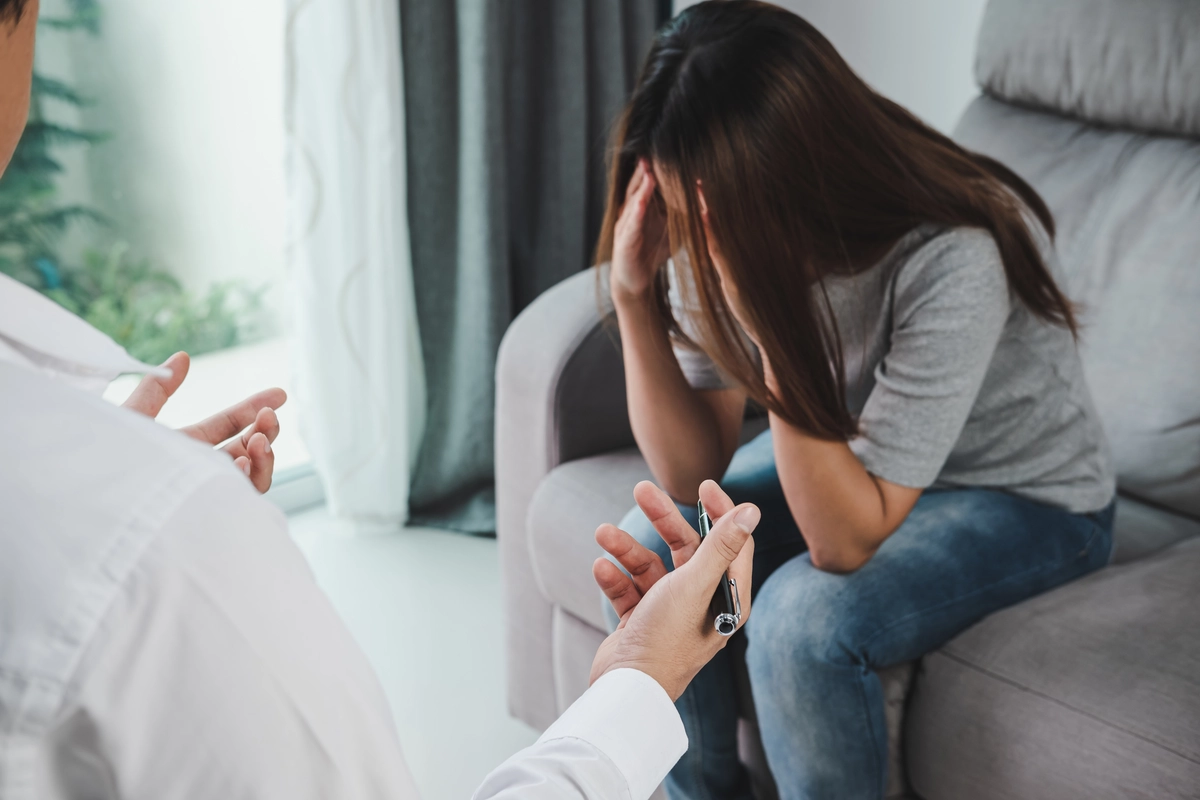24/7 Helpline:
(866) 899-221924/7 Helpline:
(866) 899-2219
Learn more about PTSD Treatment centers in Pasco County
PTSD Treatment in Other Counties

Other Insurance Options

Horizon Healthcare Service

EmblemHealth

Absolute Total Care

Regence

Health Choice

Lucent

AllWell

MVP Healthcare

GEHA

Sliding scale payment assistance

CareFirst

Aetna

ComPsych

BlueCross

State Farm

Humana

Providence

Ceridian

Group Health Incorporated

WellCare Health Plans

BayCare Behavioral Health
BayCare Behavioral Health - 7th Street offers outpatient treatment for individuals with alcohol and/...

North Tampa Behavioral Health Hospital
North Tampa Behavioral Health provides addiction treatment to men and women in Tampa, Florida. Their...

A First Step Counseling
A First Step Counseling is a private rehab located in New Port Richey, Florida. A First Step Counsel...

Medical Center of Trinity – Behavioral Health
Medical Center of Trinity – Behavioral Health is a private rehab located in New Port Richey, Florida...

Pathfinder Counseling
Pathfinder Counseling is a private rehab located in New Port Richey, Florida. Pathfinder Counseling ...

BayCare Behavioral Health – King Helie Adult Treatment Center
BayCare Behavioral Health - King Helie Adult Treatment Center offers outpatient treatment for indivi...

WestCare GulfCoast – Zephyrhills
WestCare GulfCoast – Zephyrhills is a non-profit rehab located in Zephyrhills, Florida. WestCare Gul...

WestCare GulfCoast – Port Richey
WestCare GulfCoast – Port Richey is a non-profit rehab located in Port Richey, Florida. WestCare Gul...

Pathfinder Counseling
Pathfinder Counseling is a private counseling clinic located in Zephyrhills, FL. Pathfinder Counseli...

Affordable Counseling by Susan McMillan & Associates
Affordable Counseling is a full service counseling agency that provides comprehensive counseling for...

BayCare Behavioral Health – Community Recovery Center
BayCare Behavioral Health- Community Recovery Center, located in New Port Richey, Florida, is a ment...

BayCare Behavioral Health
BayCare Behavioral Health in Port Richey, Florida offers mental health treatment, dual diagnosis tre...

San Antonio Council On Alcohol and Drug Abuse – SACADA
San Antonio Council On Alcohol and Drug Abuse (SACADA) provides evidence-based curricula to students...

The 59th Medical Wing – Lackland Alcohol and Drug Abuse Treatment
The 59th Medical Wing - Lackland Alcohol and Drug Abuse Treatment is a public rehab located in San A...

Lifetime Recovery
Lifetime Recovery is an alcohol and drug addiction center located in San Antonio, Texas. Their conti...

Baptist Medical Center Hospital – Behavioral Health
Located in San Antonio, Texas, Baptist Medical Center Hospital Offers mental health treatment that s...

Baptist Rehab Centers – Outpatient
Baptist Rehab Centers – Outpatient is a private rehab located in San Antonio, Texas. Baptist Rehab C...

Family Service Association
Family Service Association is a private rehab located in San Antonio, Texas. Family Service Associat...

Alpha Home – Outpatient
Alpha Home - Outpatient is located in San Antonio, Texas. Alpha Home - Outpatient provides spiritual...

River City Rehabilitation Center
River City Rehabilitation Center is a private rehab located in San Antonio, TX. River City Rehabilit...

Alamo Area Resource Center – Positive Recovery
Alamo Area Resource Center – Positive Recovery is a non-profit rehab located in San Antonio, Texas. ...

Treatment Associates
Treatment Associates offers counseling focused on relapse prevention. Treatment Associates is locate...

Clarity Child Guidance Center
Clarity Child Guidance Center is a private rehab located in San Antonio, Texas. Clarity Child Guidan...

MedMark Treatment Centers – Quincy Street
MedMark Treatment Centers offers outpatient medication assisted treatment for opiate addiction by th...

New Season – NW San Antonio Treatment Center
New Season - NW San Antonio Treatment Center is a private rehab located in San Antonio, TX. New Seas...

MedMark Treatment Centers – Military Drive
The MedMark Treatment Centers (MTC) – Military Drive facility is a CARF-accredited addiction rehab c...

New Season – San Antonio Treatment Center
The New Season Treatment Center (NSTC) San Antonio, TX facility provides opioid addiction treatment ...

SOBA Texas
SOBA Recovery Center is a beautiful ranch setting located outside San Antonio. SOBA Texas offers a p...

The Center for Health Care Services – Children’s Behavioral Health Campus
The Center for Health Care Services - Children's Behavioral Health Campus is an outpatient clinic th...

WestCare – Foundation Texas – San Antonio
WestCare – Foundation Texas – San Antonio is a non-profit rehab located in San Antonio, Texas. WestC...

New Choices Treatment Center
The New Choices Treatment Center is a luxury treatment drug and alcohol addiction rehab center in Sa...

Positive Recovery Center – San Antonio
The Positive Recovery Center San Antonio, TX facility is committed to ensuring each individual finds...

San Antonio Behavioral Healthcare Hospital
The San Antonio Behavioral Healthcare Hospital (SABHH) is a leading provider of substance abuse trea...

Blue Heron Recovery
Blue Heron Recovery is an outpatient rehab facility located inside Los Patios in San Antonio, TX. Bl...

San Antonio Recovery Center in Culebra
San Antonio Recovery Center in Culebra is a private rehab located in San Antonio, Texas. San Antonio...
















Operation PAR
Operation PAR - Washington Street offers outpatient treatment for individuals with alcohol and/or su...

Patella House Recovery Residence
Patella House Recovery Residence is a private rehab located in Port Richey, Florida. Patella House R...

Springbrook Outpatient Center
Springbrook Outpatient Center is a private rehab located in Holiday, Florida. Springbrook Outpatient...

AA – Alcoholics Anonymous
AA – Alcoholics Anonymous is a non-profit rehab located in New Port Richey, Florida. AA – Alcoholics...

Pathfinder Counseling
Pathfinder Counseling is a private rehab located in Port Richey, FL. Pathfinder Counseling specializ...

Alpha Counseling Services
Alpha Counseling Services is a private rehab located in Zephyrhills, Florida. Alpha Counseling Servi...

Novus Medical Detox Center
Novus Medical Detox Center offers a unique and effective medical detox drug treatment program that i...

WestCare – GulfCoast
WestCare - GulfCoast is an outpatient clinic that provides Drug Court, Prevention Services, and Vete...

WestCare – GulfCoast
WestCare - GulfCoast is an outpatient clinic that provides Drug Court, Prevention Services, and Vete...

Affirming Solutions
Affirming Solutions is a private rehab located in San Antonio, Texas. Affirming Solutions specialize...

Mars Substance Abuse
Mars Substance Abuse is a private rehab located in San Antonio, Texas. Mars Substance Abuse speciali...

La Familia Counseling Center
La Familia Counseling Center is a private rehab located in San Antonio, Texas. La Familia Counseling...

The Right Step – San Antonio Alcohol & Drug Rehab Center
The Right Step – San Antonio Alcohol & Drug Rehab Center is a private rehab located in San Antonio, ...

Al Anon Family Groups
Al Anon Family Groups is a non-profit rehab located in San Antonio, Texas. Al Anon Family Groups spe...

AA – Alcoholics Anonymous – Goliad Group
AA – Alcoholics Anonymous – Goliad Group is a non-profit rehab located in San Antonio, Texas. AA – A...

Mission Vista Behavioral Health Center
Mission Vista Behavioral Health Center is a private rehab located in San Antonio, Texas. Mission Vis...

Agape Christian Therapies
Agape Christian Therapies is a private rehab located in San Antonio, Texas. Agape Christian Therapie...

AAMA – Selena Center for Youth Potential
AAMA - Selena Center for Youth Potential offers inpatient treatment female adolescents with alcohol ...

Patrician Movement – Residential
Patrician Movement – Residential is a private rehab located in San Antonio, Texas. Patrician Movemen...

Image Counseling Center
Image Counseling Center is a private rehab located in San Antonio, Texas. Image Counseling Center sp...

AA – Alcoholics Anonymous – Group Esperanza
AA – Alcoholics Anonymous – Group Esperanza is a non-profit rehab located in San Antonio, Texas. AA ...

Alpha Home – Camden Residence
Alpha Home is a dual diagnosis substance abuse treatment center located in San Antonio, TX. They off...

Texas Treatment Services
Texas Treatment Services is a private rehab located in San Antonio, Texas. Texas Treatment Services ...

Nix Behavioral Health
Nix Behavioral Health is a private rehab located in San Antonio, Texas. Nix Behavioral Health specia...

AA – Alcoholics Anonymous – Tradeway Street
AA – Alcoholics Anonymous – Tradeway Street is a non-profit rehab located in San Antonio, Texas. AA ...

Grupo Unidad
Grupo Unidad is a non-profit rehab located in San Antonio TX. Grupo Unidad specializes in the treatm...

San Antonio For Christ Christian Church
San Antonio For Christ Christian Church is a private rehab located in San Antonio, Texas. San Antoni...

AA – Alcoholics Anonymous – Castroville Road
AA – Alcoholics Anonymous – Castroville Road is a non-profit rehab located in San Antonio, Texas. AA...

La Hacienda Outreach
La Hacienda Outreach is a private rehab located in San Antonio, Texas. La Hacienda Outreach speciali...

AA – Alcoholics Anonymous – Un Paso Hacia Adelante
Alcoholics Anonymous (AA) - Un Paso Hacia Adelante is a closed 12-step meeting provided in Spanish f...

Center for Healthcare Services – Adult Mental Health
Center for Healthcare Services - Adult Mental Health is a private rehab located in San Antonio, TX. ...

Patrician Movement – Claudia Street
Patrician Movement – Claudia Street is a private rehab located in San Antonio, Texas. Patrician Move...

A Turning Point
A Turning Point offers outpatient treatment for individuals with alcohol and/or substance addiction....

AA – Alcoholics Anonymous – Intergrupal Hispana
AA – Alcoholics Anonymous – Intergrupal Hispana is a non-profit rehab located in San Antonio, Texas....

Al-Anon and Al-Ateen Info Services
Al-Anon and Al-Ateen Info Services is a non-profit rehab located in San Antonio, Texas. Al-Anon and ...

The Right Step
The Right Step San Antonio drug rehab and alcohol rehab center offers outpatient treatment for adult...

Palmer Drug Abuse Program – Rise Recovery
Palmer Drug Abuse Program – Rise Recovery is a private rehab located in San Antonio, Texas. Palmer D...

Laurel Ridge Treatment Center – Babcock Road
Laurel Ridge is a psychiatric hospital offering a comprehensive continuum of behavioral healthcare s...

Baptist Rehab Centers – Southeast Baptist Hospital
Baptist Rehab Centers – Southeast Baptist Hospital is a private rehab located in San Antonio, Texas....

Center for Healthcare Services – Paul Elizondo Community Mental Health Clinic
Center for Healthcare Services – Paul Elizondo Community Mental Health Clinic is a private rehab loc...

Alpha Home
Alpha Home is a private rehab located in San Antonio, Texas. Alpha Home specializes in the treatment...

The Center for Health Care Services – Children’s Behavioral Health
The Center for Health Care Services - Children's Behavioral Health is an outpatient clinic that offe...

Abraxas Hector Garza Center
Hector Garza Center is accredited by The Joint Commission and is a trauma-informed treatment environ...

InBetween Living Rehabilitation Center
InBetween Living Rehabilitation (IBL) Center provides 20 beds CO-ED ages 18 and up in a highly struc...

San Antonio Recovery Center in Cagnon
San Antonio Recovery Center in Cagnon is a private rehab located in San Antonio, Texas. San Antonio ...

San Antonio Recovery Center Alumni and Outpatient Services
San Antonio Recovery Center Alumni and Outpatient Services is a private rehab located in San Antonio...

San Antonio Women’s Rehab
Since 2004, the San Antonio Women’s Rehab has been a place for new beginnings, a place to discover w...

AAMA – Selena Outpatient
AAMA – Selena Outpatient is a private rehab located in San Antonio, Texas. AAMA – Selena Outpatient ...

Deborah Judith Elite Counseling
Deborah Judith Elite Counseling is a private rehab located in San Antonio, Texas. Deborah Judith Eli...

Center for Healthcare Services – Children Behavioral Health
Center for Healthcare Services – Children Behavioral Health is a public rehab located in San Antonio...

Volunteers of America – Living in Good Healthy Treatment – LIGHT
Living in Good Healthy Treatment - LIGHT is a non-profit rehab located in San Antonio, TX. Living in...

San Antonio Men’s Rehab
Adult & Teen Challenge of Texas’ San Antonio Men’s Rehab was established in 1968 (the first Teen Cha...

Alcoholic Rehabilitation Center – Basse Road
Alcoholic Rehabilitation Center – Basse Road is a private rehab located in San Antonio, Texas. Alcoh...


























































































































































































































